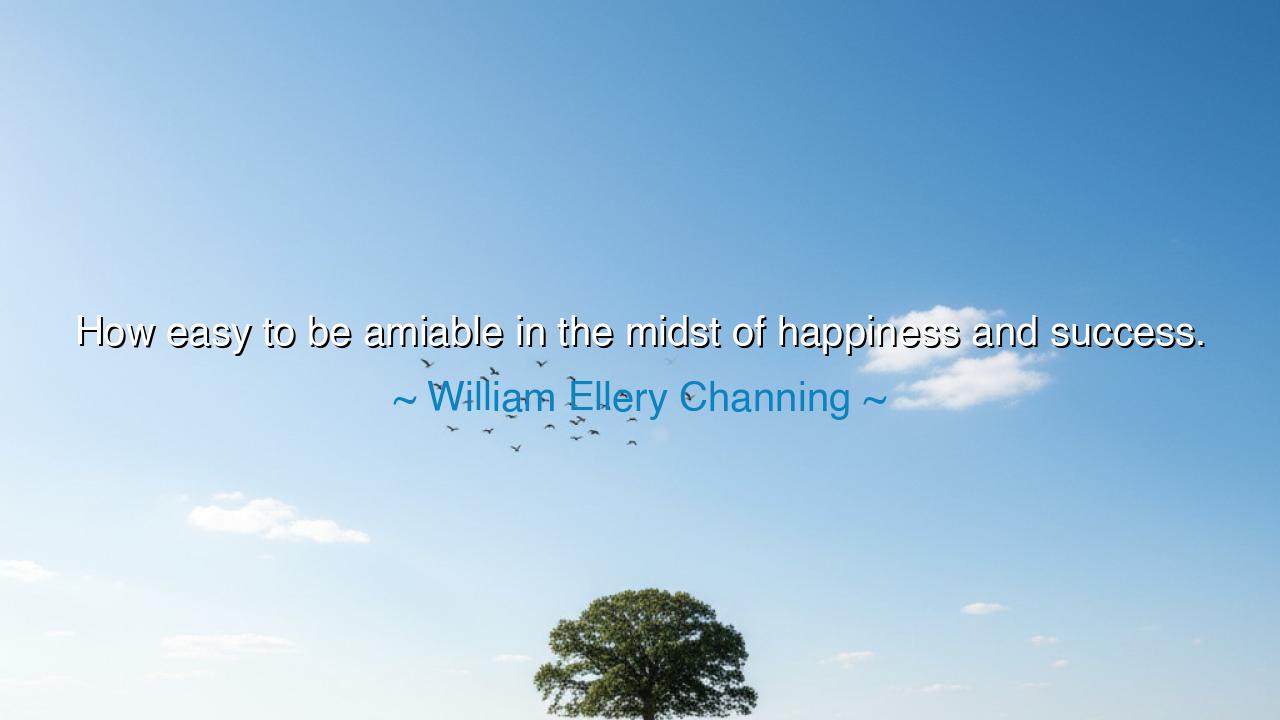
How easy to be amiable in the midst of happiness and success.






"How easy to be amiable in the midst of happiness and success." Thus spoke William Ellery Channing, a voice of reason and moral light in an age of awakening faith and reform. His words shine like a mirror held before the human heart, reflecting one of its oldest truths—that kindness and gentleness are easily worn as garments when life is soft and the world smiles upon us. Yet beneath this observation lies a deeper question: if it is easy to be gracious in joy, can we remain amiable in sorrow, in trial, and in defeat? For it is not the calm seas that reveal a sailor’s skill, but the storm.
Channing, a preacher and thinker of the early nineteenth century, lived in a time of social division and spiritual questioning. His philosophy was rooted in the belief that the measure of a person’s virtue lies not in comfort but in character. In this brief yet piercing saying, he reminds us that happiness and success make friendliness effortless. When we are blessed, when fortune smiles and praise surrounds us, the heart is naturally open, warm, and forgiving. But such amiability costs us little; it demands no courage. The true test of goodness, he implies, begins when happiness fades, when misunderstanding wounds us, or when failure casts its long shadow across the soul.
It is easy to smile when the harvest is full, but can one remain kind when the field lies barren? Easy to forgive when one is honored, but can one forgive when one has been scorned? This is the challenge at the core of Channing’s wisdom: that virtue born of circumstance is no virtue at all. To be truly amiable, one must cultivate a heart that does not depend on success for its serenity, nor on applause for its warmth. The sweetness of the soul must not be seasonal—it must endure through all weathers, as the evergreen endures both sun and snow.
History offers us shining examples of such enduring grace. Consider Abraham Lincoln, who bore the crushing weight of a divided nation. In his most troubled days, when critics mocked him and war tore at his heart, he remained humble, patient, and kind. His laughter was gentle, his words forgiving. When victory finally came, he did not gloat or punish his enemies, but spoke of healing and mercy. “With malice toward none,” he said—words born not from triumph, but from character. Lincoln embodied the very lesson Channing wished to teach: that to be amiable in suffering is a greater strength than to be pleasant in prosperity.
The origin of this wisdom lies not merely in religion or philosophy, but in the universal rhythm of human experience. Every life moves through cycles of gain and loss, of joy and sorrow. When fortune smiles, our hearts swell and generosity flows freely; when hardship strikes, bitterness threatens to take its place. Channing reminds us that virtue must not be a reflection of our circumstance, but a light within that shines regardless of what the world gives or takes away. Amiability—true kindness—is not an ornament of the fortunate; it is the discipline of the wise.
To live by this teaching is to train the spirit in steadiness. When praised, remain humble. When slighted, remain kind. When blessed, be grateful without pride; when wronged, be gracious without resentment. The world will often give you reasons to close your heart—but to keep it open, even then, is the highest act of strength. It is this inner consistency, this stability of virtue, that separates the truly noble from the merely agreeable.
So, my children of tomorrow, remember Channing’s quiet warning. It is no great feat to be kind when life is easy; the truest test comes when kindness costs you something. Cultivate amiability not as a mood, but as a principle; not as a performance, but as the natural language of your soul. Practice it in small moments—when patience is tested, when others fail, when gratitude is forgotten. In such moments, you forge the strength of heart that endures.
For in the end, the world will forget your triumphs, but it will remember how you treated others in your darkest days. Let your courage






AAdministratorAdministrator
Welcome, honored guests. Please leave a comment, we will respond soon